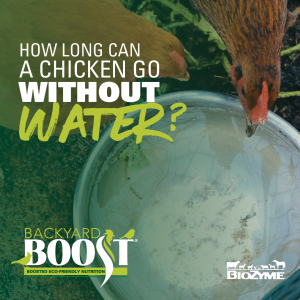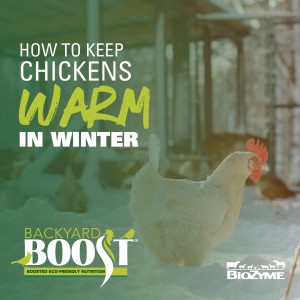
The colder temperatures have moved in across many parts of the country, and with winter officially kicking off this month, those temps are here to stay. You probably started your backyard chicken flock during the spring when the sunshine was plentiful, and the days were long. How will you keep your feathered friends healthy and producing during the chilly winter months?
Shelter
You’ve already provided them with a coop, but you might need to make a few modifications to get it winterized for your birds. Although when you think of providing warmth, you think of secure structures; however, you will want your coop to have some ventilation or air movement. Otherwise, the humidity from the chickens’ own body heat can cause frostbite from the moisture. The lack of ventilation can also cause ammonia build up, which can damage the birds’ respiratory systems.
To provide adequate ventilation, provide a screened in gap between the roof and the side of the coop, or if you have windows, put screened windows in to allow for air movement. You can close the windows at night when temperatures tend to get even colder.
If space allows and you are really concerned about the amount of time your chickens are spending outside but you still want them to get out and peck around, you can build them a sunroom of sorts. Cover their run with clear plastic that will stop the wind and absorb the sun’s heat.
Heat
Your chickens have a natural heat source – their own feathers! They will ruffle their feathers and will huddle close to one another in the coop to stay warm. They don’t like to have wet feet or cold feet, so be sure to use plentiful bedding within the coop to keep the floor dry. Unless there is an unusual cold snap predicted for you area, try to avoid heat lamps or heaters of any sort. Heat bulbs and heaters cause a fire hazard when they are too close to the dry bedding or structure. Too much heat can lead to a fire, destroying the coop and the lives inside.
Be sure to have plenty of roosting bar space 2-3 feet above the ground. Chickens will want to roost high enough to be off the damp ground to stay warm. It is also on the roosting bar where they will ruffle their feathers together during the night to share their body heat with one another.
Although the next tip doesn’t really provide them with heat, it will help them avoid frostbite. Apply petroleum jelly (think Vaseline) to their wattle and comb – basically any red skin on their face – to avoid frostbite. Apply it generously, avoiding their eyes. If it has turned black, it likely has already been frostbitten. Keep applying during the cold temperatures.
Light
Although we discourage heat bulbs, for warmth, light is of upmost importance to your birds if you want to continue to receive eggs during the shorter days. After the birds molt in late fall, some breeds have a harder time laying at least one egg per day, due to the shortened days. To help the birds think the days are longer, a simple 40-Watt bulb in a reflector shade and hang it from the ceiling so the entire coop receives good lighting. An additional light might be needed to spark the interest of the chickens back into egg production.
Feed & Water
Just like the rest of the year, feed and water are essential to the chicken’s growth, maintenance and egg production. Continue to feed them daily, providing them a nutrient-rich supplement like Backyard Boost™ Daily Essentials with a prebiotic, vitamins, minerals and organic trace minerals for their overall health and improved egg production.
Backyard Boost Daily Essentials is an all-in-one supplement to support poultry gut health and nutritional health. It can be mixed in with the chicken feed or scattered on the ground for easy pecking. It contains Amaferm®, a prebiotic proven to increase digestion feed and absorption of nutrients to help maximize egg production and quality, provides additional protein to support growth, feather quality, and egg production, contains calcium and other nutrients for natural improvement of eggshell and yolk quality, and helps improve gut health and overall well-being.
Water is the most essential nutrient for any living being. Make sure that your chickens’ water doesn’t contain ice each morning and evening. Or you can purchase an electric, heated waterer to keep the ice off of the water. Either way, you will want to provide your birds with fresh water daily.
The winter weather is already here, but the birds in your backyard are sure to flourish with a few extra steps to maintain them in the colder temps. Keep them dry and comfortable, provide ventilation and proper nutrition, and they should thrive in the winter. To learn more about caring for your backyard birds or how to purchase Backyard Boost products, visit www.backyardboost.co.

